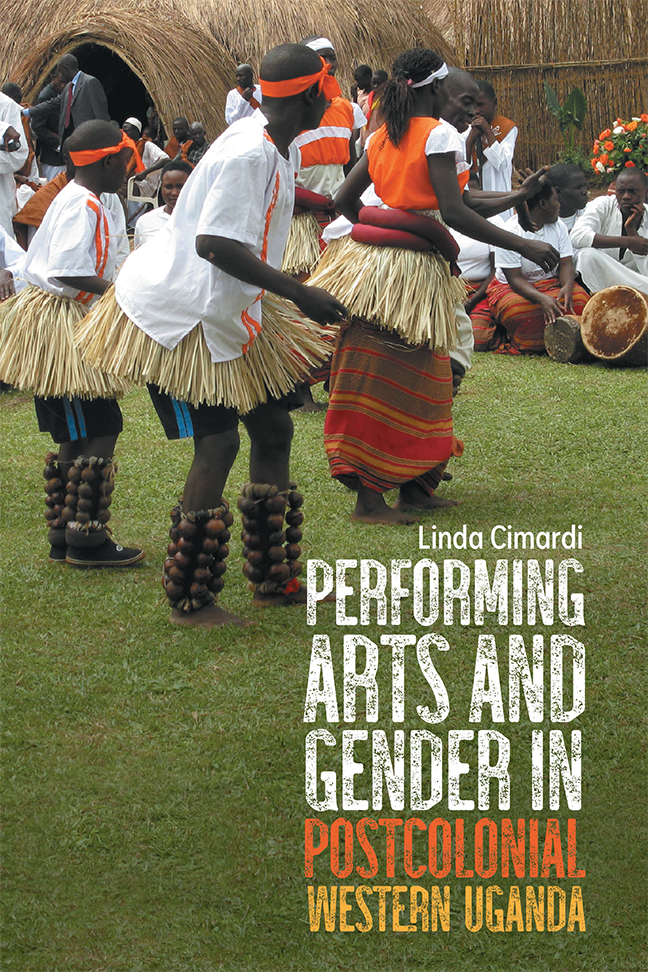Book contents
- Frontmatter
- Contents
- List of Illustrations
- Foreword
- Acknowledgments
- Note on Language
- Note on the Musical Examples
- Note on Online Audio and Video Material
- Prelude: Encountering Local Culture in Western Uganda
- Introduction: Approaching Gender and Performing Arts in Bunyoro and Tooro
- One “Traditional Dance Preserves Culture and Shows People How to Behave”: Runyege, MDD, and Gender
- Two Singing Marriage, Runyege, and Labor
- Three “Women Aren't Supposed To”: Instrument Playing in the Past and Today
- Four Shaking the Hips, Stamping the Feet: The Runyege Dance
- Five Narrating and Representing Local Culture: Theater in Songs and Dances
- Six Trans-Performing and Morality in Cultural Groups
- Postlude: Gendering Culture
- I Glossary of Terms in Runyoro-Rutooro
- II Historical Recordings from Bunyoro and Tooro
- Author's Interviews
- References
- Index
Three - “Women Aren't Supposed To”: Instrument Playing in the Past and Today
Published online by Cambridge University Press: 17 December 2023
- Frontmatter
- Contents
- List of Illustrations
- Foreword
- Acknowledgments
- Note on Language
- Note on the Musical Examples
- Note on Online Audio and Video Material
- Prelude: Encountering Local Culture in Western Uganda
- Introduction: Approaching Gender and Performing Arts in Bunyoro and Tooro
- One “Traditional Dance Preserves Culture and Shows People How to Behave”: Runyege, MDD, and Gender
- Two Singing Marriage, Runyege, and Labor
- Three “Women Aren't Supposed To”: Instrument Playing in the Past and Today
- Four Shaking the Hips, Stamping the Feet: The Runyege Dance
- Five Narrating and Representing Local Culture: Theater in Songs and Dances
- Six Trans-Performing and Morality in Cultural Groups
- Postlude: Gendering Culture
- I Glossary of Terms in Runyoro-Rutooro
- II Historical Recordings from Bunyoro and Tooro
- Author's Interviews
- References
- Index
Summary
In 2008, while researching Nyoro royal music, I was introduced to a bakondeere ensemble (sing. mukondeere) from the village of Kibiro, on the dry and salty shores of Lake Albert in Eastern Bunyoro. The group played the makondeere side-blown trumpets (Mbabi-Katana 1982; Wachsmann 1953: 351–359) using the interlocking or hoquetus technique, common in similar ensembles in Central African Republic (Arom 1985). Since the group had only recently formed, some of my questions sought to investigate the discontinuities in the practice of makondeere playing due to the suppression of the Nyoro monarchy between 1967 and 1994 (Kahunde 2012a).
L: Can people from other parts of Bunyoro join the group?
B: Other people are allowed, anyone is allowed to join the group, from anywhere in the world.
L: And women?
B: No, not women.
L: So a muzungo [white] man can play [the makondeere] at the Mpango for the king?
B: If you are a man, even a muzungo man, you can play makondeere.
L: During the Mpango as well?
B: Yes, also during the Mpango.
L: Has it always been like this?
B: If the person can play makondeere and respects the culture, he is allowed to play.
[…]
L: Why can everybody but women play makondeere?
B: In the culture of Bunyoro, a woman is not supposed to play makondeere, or to play ngoma [double-skin cylindroconical drum].
Until the abolition of the monarchies in the late 1960s, the various groups of bakondeere belonged to particular clans, were based in specific villages all around Bunyoro, and took turns to serve as royal musicians at the court (Wachsmann 1953: 356). When the groups were revived in the late 1990s–early 2000s, the elders, like Francis Kiparu in Kibiro, started training new musicians. Because of the scarcity of volunteers, they welcomed anyone interested, no matter the clan or village of origin. Hence my question about whether any Munyoro could join the bakondeere. I was surprised when the bakondeere said that any person (muntu) could join their group: even a white (muzungo or mujungo) man was allowed to play—but not a woman, that was out of the question.
- Type
- Chapter
- Information
- Performing Arts and Gender in Postcolonial Western Uganda , pp. 101 - 131Publisher: Boydell & BrewerPrint publication year: 2023



